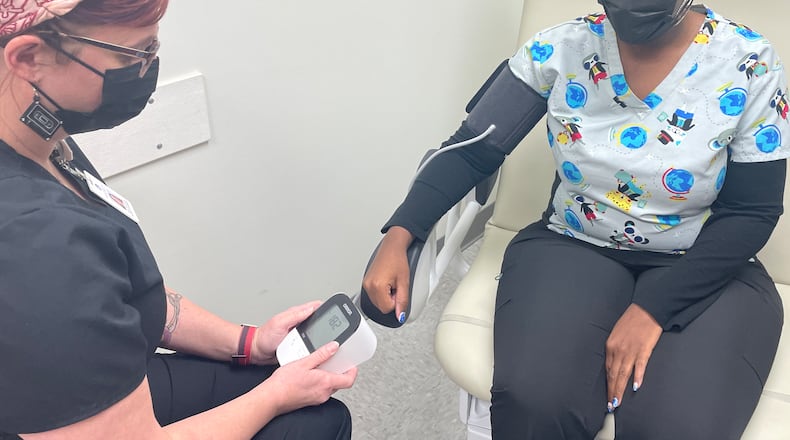“The goal of the grant was to help improve blood pressure control and cardiac health in patients who have a poor outcome with COVID-19,” said Angie Holycross, RN care coordinator with the Community Health Centers of Greater Dayton.
Hypertension results from having blood pressure measures consistently high above normal. High blood pressure puts individuals at risk for other health problems, such as heart disease, heart attack, and stroke, according to the Centers for Disease Control.
This grant program provides blood pressure monitors for qualifying patients to take home and use twice a day on three days a week. The results are uploaded via Bluetooth with the patient’s phone, and then that data is sent to their doctor at the health centers. Patients and their doctor also get an alert if their blood pressure is dangerously high.
“When (the results) are sent remotely to the provider, we can act as well, so it gives us the opportunity to make medication changes, talk to them about diet or lifestyle, and then make those changes before they come back into the office,” Holycross said. There is also an educational aspect of the program where patients receive 30 minutes of education on hypertension, along with alerts and information from the American Heart Association.
Community Health Centers of Greater Dayton is two years into this three-year grant. They currently have met 38% of their grant goal, serving approximately 649 patients of their goal of 1,700, so there are spots still open in the program for more patients.
“Some of the biggest outcomes we’ve had is our percentage of controlled patients,” Holycross said. Patients with uncontrolled high blood pressure have a systolic blood pressure of equal to or greater than 140 mmHg or an average diastolic blood pressure equal to or greater than 90 mmHg. Doctors have found of those who complete this program, 73% of those patients are able to control their blood pressure and continue to be controlled. Holycross said this is higher than those patients who do not take part in the program.
Qualifying patients include patients over 18 years old who have been diagnosed with uncontrolled hypertension, and they must also have a smartphone and a valid email address. Individuals must also be a patient of the Community Health Centers of Greater Dayton, and each of their six locations are accepting new patients, regardless of what type of health coverage patients’ have or if they don’t have coverage. This blood pressure monitoring program is also free for patients. To schedule a new patient appointment, individuals can call (937) 461-6869.
For more information on the Community Health Centers of Greater Dayton, visit https://www.communityhealthdayton.org/.
How can you prevent or manage high blood pressure?
Many people with high blood pressure can lower their blood pressure into a healthy range or keep their numbers in a healthy range by making lifestyle changes, according to the Centers for Disease Control. The CDC suggests the following:
- Getting at least 150 minutes of physical activity each week (about 30 minutes a day, five days a week)
- Not smoking
- Eating a healthy diet, including limiting sodium (salt) and alcohol
- Keeping a healthy weight
- Managing stress
About the Author

